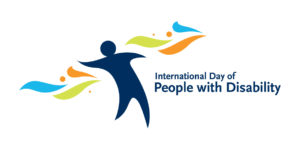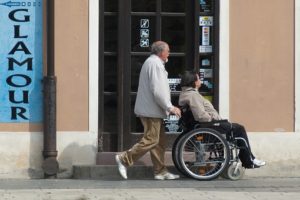“US” and “THEM.”
 One of the ways in which we too often fail to respect the dignity of people and of whole groups of people is to talk about “them”. We make “them” into an object of discussion or a problem to be solved. Often, we reduce “them” to a characteristic, which distinguishes “them” from “us”. Although we may have the best of intentions in having special days for people with disabilities the decision may contribute to a belief that somehow “they” are different from “us”. We gain superiority because “they” are disabled and somehow “we” are not. Sometimes we may even emphasise that it is our Christian duty to care for “them.”
One of the ways in which we too often fail to respect the dignity of people and of whole groups of people is to talk about “them”. We make “them” into an object of discussion or a problem to be solved. Often, we reduce “them” to a characteristic, which distinguishes “them” from “us”. Although we may have the best of intentions in having special days for people with disabilities the decision may contribute to a belief that somehow “they” are different from “us”. We gain superiority because “they” are disabled and somehow “we” are not. Sometimes we may even emphasise that it is our Christian duty to care for “them.”
Such “othering” denies the unity of the human family. We are all children of the one God, all equally created in the image and likeness of God. Do we need to ask ourselves if we are contributing to an “us” and “them” mentality because of classifiers that tend to put people into people who walk, talk, hear and speak, like “us?”. Have we missed something? We are all limited, only God is without limits.
The Office for Catholic Social Justice recently released a document “Us” not “Them” Disability and Theology and Social Teaching by Justin Glyn SJ. I found the booklet raised many of the issues that the Emmanuel Centre in Perth has wrestled with over many years.
I found myself thinking about the name of Emmanuel Centre, a Self-Help Centre and leaving off the last four words “for people with disabilities”. I asked myself would anyone notice? What if we changed our name to Emmanuel Centre for people with different abilities?
1981, the year Emmanuel Centre started, was designated as the International Year of Disabled Persons.
Reflecting back on the establishment of Emmanuel, we have all benefited. We have come to appreciate that we are all made in the image and likeness of God and by working together, identifying and using our different abilities, we can experience a bigger picture of who God is and what each individual can contribute to the understanding of the power of God. It is important for us to recognise that we are all part of the Body of Christ. The smallest or insignificant part contributes to the better functioning of the Body. We are all on a journey home walking with each other and with Jesus. The name Emmanuel – God with us. constantly keeps in the forefront of our minds who is directing the endeavour.
 When I think of the people with different abilities that have walked the journey with me over the last 38 years, I appreciate how people who have never heard a sound because of their deafness have taught me to talk with my hands. I appreciate that my body, my facial expressions are drawn from within me and I have a deeper experience of what a relationship is.
When I think of the people with different abilities that have walked the journey with me over the last 38 years, I appreciate how people who have never heard a sound because of their deafness have taught me to talk with my hands. I appreciate that my body, my facial expressions are drawn from within me and I have a deeper experience of what a relationship is.
I understand how access is important. Facing a set of stairs or even the lip of a small step means you are not welcome. But you have ideas and thoughts to share regardless of your ability to walk. I have never mastered the ability to read Braille with my fingertips, but my friend has. Another friend has never spoken but the love of Jesus pours out of her heart in bucket loads.
Self Help turns the conventional approach to services on its head and requires those interacting with Emmanuel Centre to take the time and effort to understand how relationships between giver and receiver and status issues are replaced with a non-pathological mutually shared experience of what it means to “love one another”.
Self Help identifies the skills and capacities that each contributes in supportive relationships where the receiving and giving are important.
Barbara Harris
Emmanuel Centre
Visit the International Day of People with Disability website
International Day of People with Disability Logo obtained from their website.
Wheelchair image by Zoran Stupar obtained from Pixabay. Used with permission.
Thumbnail photo by RUN 4 FFWPU from Pexels. Used with permission.
